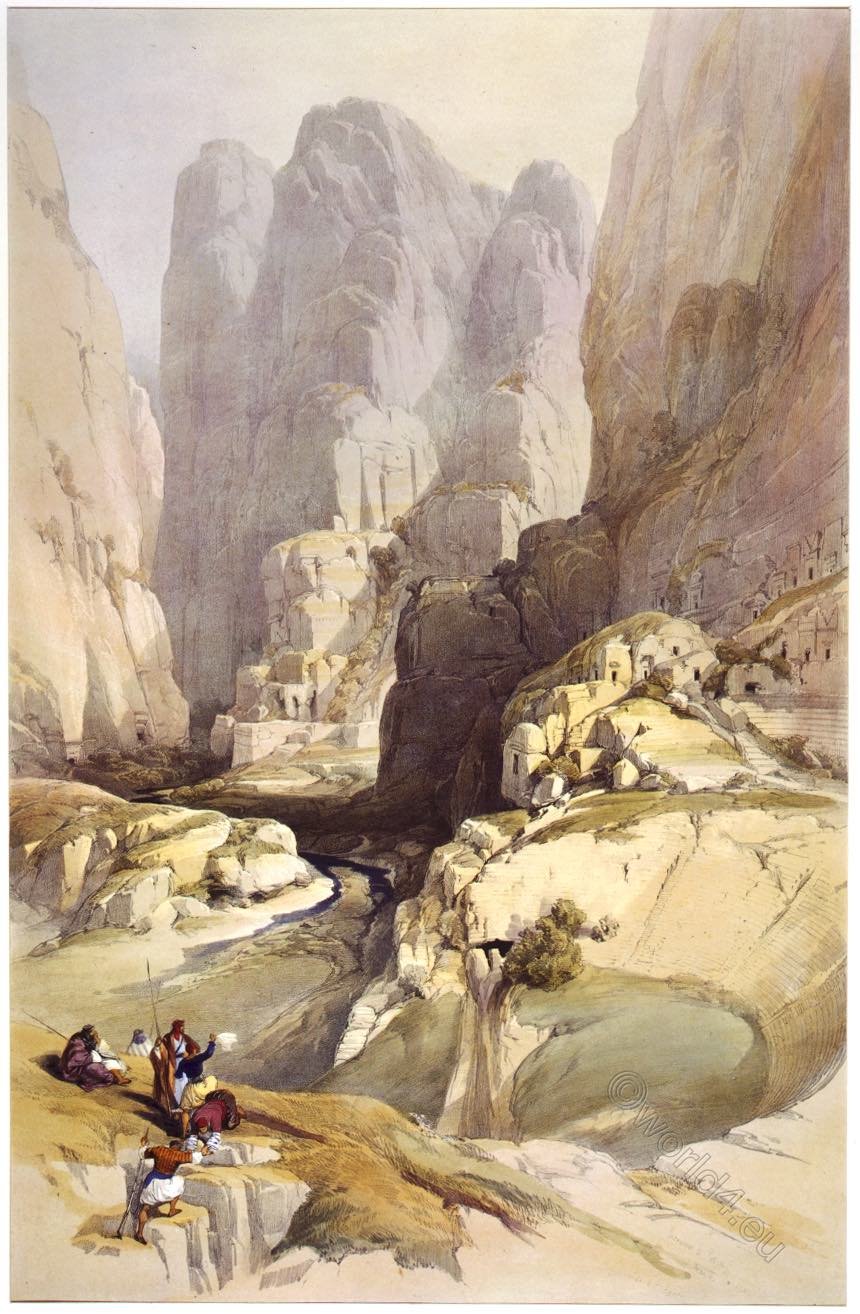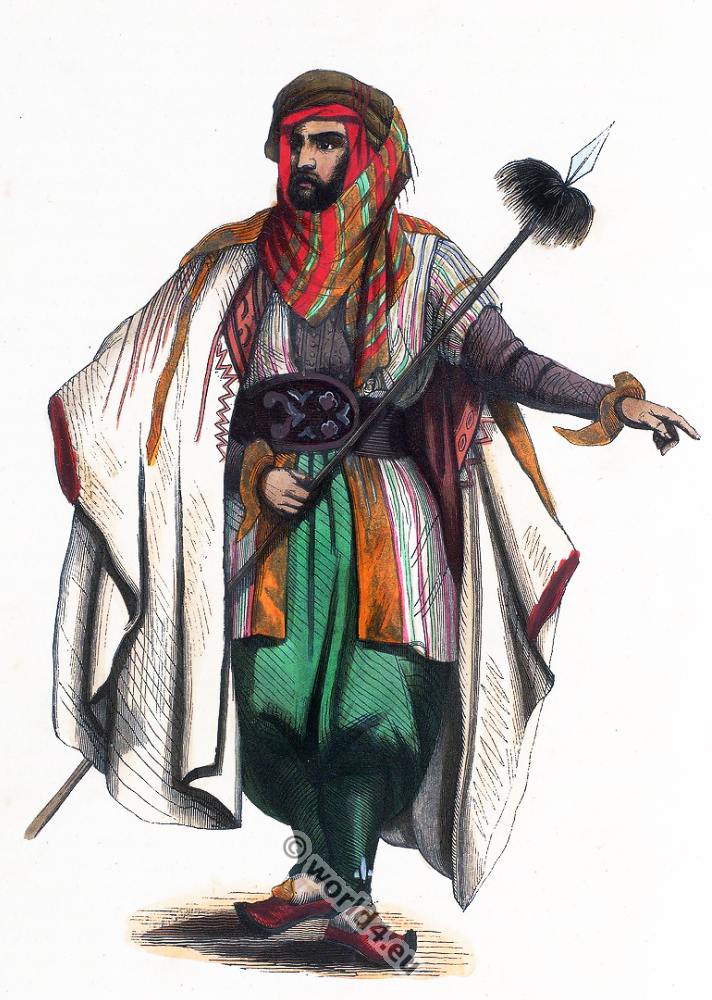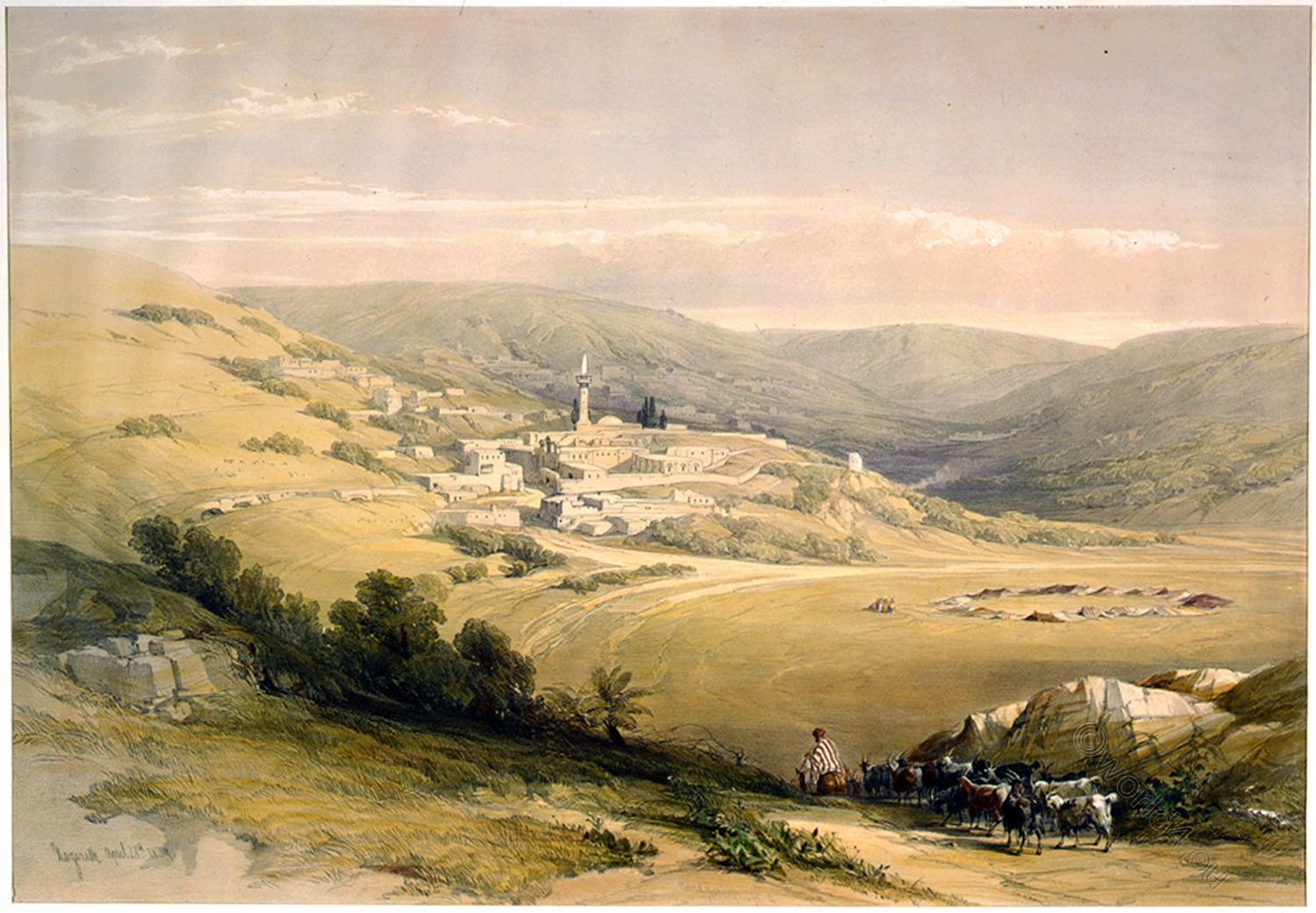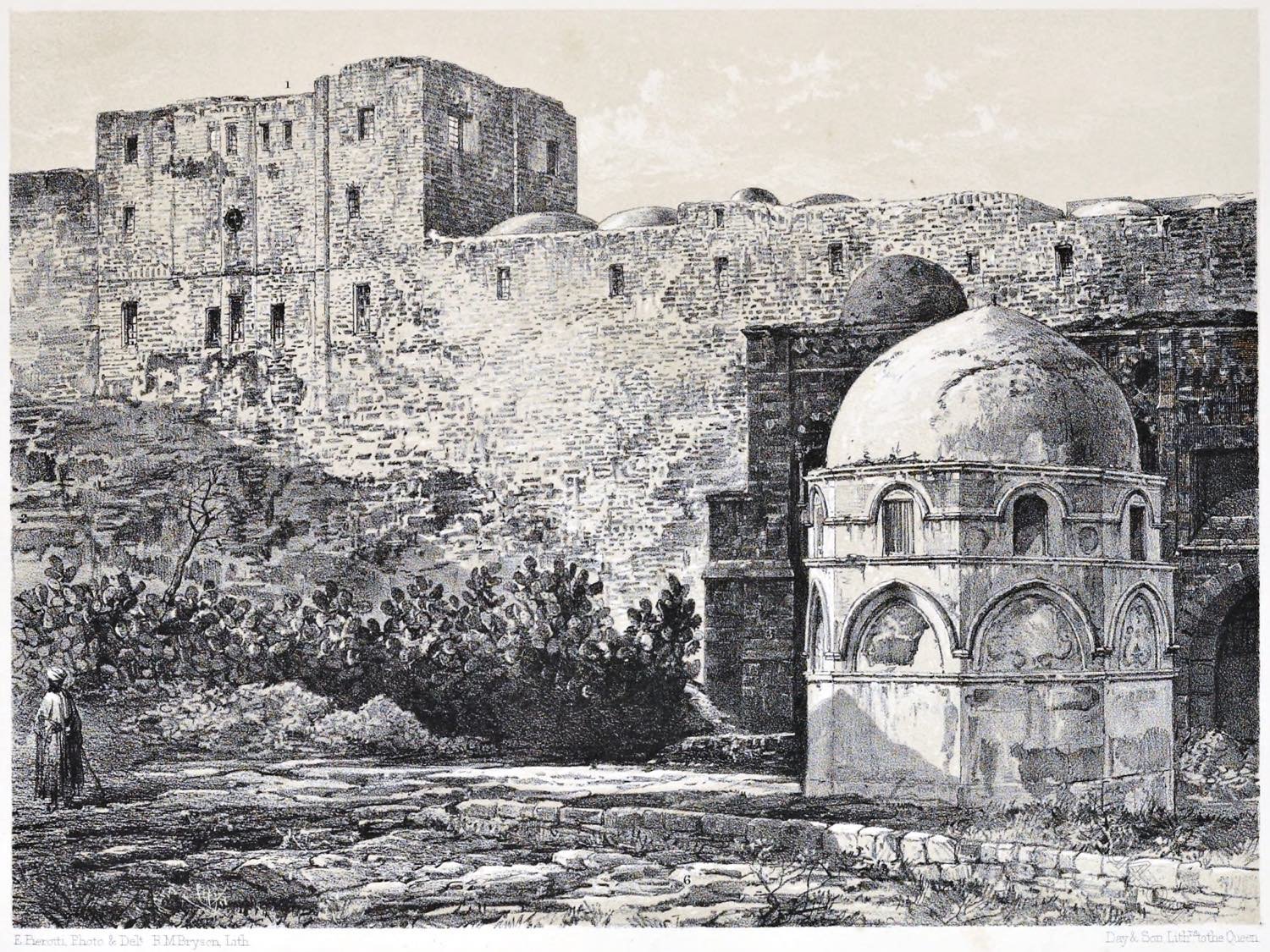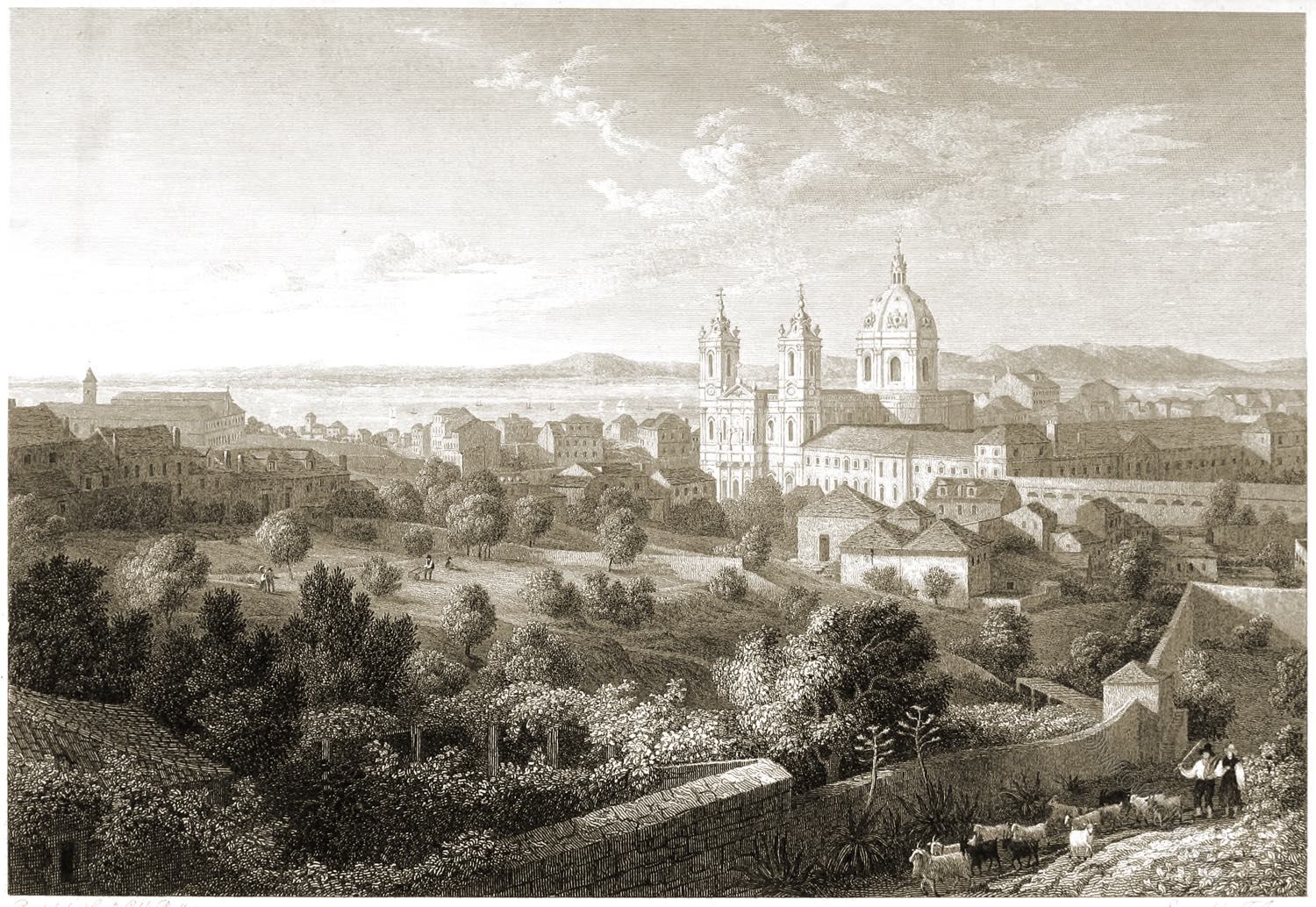
Beirut, the ancient Berothah. Bairuth et le Mont Liban.
BEIRUT, AND M0UNT LEBANON.
This is the best view of Beirut, taken from near a villa formerly occupied by Mr. Farren, the consul-general for Syria, now resident at Damascus. The distant range of Leoanon is from hence particularly fine; the square-topped mountains, which nature, however, has made less square than the artist’s pencil has made them, are conspicuous from all parts; the villas, just without the walls, are those of the American missionaries. On the declivities of the mountain are seen many monasteries in noble positions, each with its grove and garden, and overlooking the sea, the shore, the plain. On the left are the old Moorish castles, which help to set off, by their feudal and antique aspect, the poor, prison-like looking town; on the right is the tower of the new lazaretto, lately built by Ibrahim Pasha.
The women in the foreground wear on the head the favourite ornament of Lebanon, the silver horn, carved with grotesque figures and characters, and adorned with false jewellery; it is hollow, more than a foot high, placed upright on the head, secured under the chin by a silk cord; the veil is carried over it, and falls down low, in a theatric manner, on one side of the face and shoulder. In the more wealthy families, the ladies, the wives of the sheikhs and princes, wear a more splendid horn, brilliant, not with false, but real jewels: on marriage ceremonies, it is often worn by the bride and her many bride-maids; it is not elegant or beautiful, and, if worn in the streets of cities, the effect would be almost ludicrous; but on the mountain sides, and barren and solitary places, it relieves. the monotony of the peasant costume, and looks bold and original.
In the foreground is the prickly pear, so abundant in the environs; it grows with wonderful rapidity; if a single leaf is planted, in four years its produce is sufficient to fill a room; indeed, the whole substance, stalk, pulp, and the voluminous covering of the fruit, is little else than leaves folded together and intertwined: when the mass of leaf, &c. is stripped, the fruit within is of the size of a jargonel pear; the flavor is not pleasant at first, being of a sickly sweet; but many persons become fond of it: the flower is small, and of a bright and beautiful yellow. The hedges of the paths and gardens around the town are often composed, in part, of this plant: it is an effectual guard against forbidden feet, which would find it difficult to break through its intricate foldings and prickly masses.
Beirut is the most desirable residence in Syria; the situation is lovely, as also is the scenery on every side; the town is dirty and disagreeable, when compared with the well-built Tripoli and its fine-flowing Kadesha; Lebanon is grand from Beirut, it is also grand, but more distant, from Tripoli. The former, however, is the port of Damascus and central Syria; it is more conveniently situated for receiving intelligence, shipping, &c., from Europe; and has more commercial activity than any other Syrian port. Many merchants reside in Beirut, besides the consuls and agents for the various European powers: to a European it is infinitely more lively and interesting as a residence than Damascus, where, in the midst of many luxuries, and streams, and groves, he will often be induced to say, “I am alone; my companions and my people are far from me; and no man regardeth me.”
Beirut is the dearer place of the two; yet a resident can soon gather as many comforts and enjoyments to his home, as if he dwelt in Damascus; the sea and the splendid bay offer a more attractive, a more varied spectacle than the Barrada, the Abana, and their three brother streams; and Lebanon offers excursions and visits to monasteries, glens, and castles, that bring vividly to mind Italy and Scotland in the heart of Syria. The town and neighbourhood are of late greatly improved, and are rapidly improving; many new dwellings and villas have been built, some of them with much taste. The rent of a good house, for a small family, is £30; for a larger, a villa and garden, forty or fifty pounds a year; rent is thus risen, because of the many Frank residents lately settled here: meat is 4d. the pound; wine 4d. the bottle; superior wine of Lebanon, 9d. or Is.; the latter is white and red; the strong white wine, slightly sweet, is the best; the vin d’oro, the most delicate; it is the champagne of the East, mousseux when bottled, and inspiring. Two or three Frank bakers are settled here, so that the bread is good, a rare luxury in the Levant.
The consuls and merchants of different nations live on a friendly and social footing, with dinner and evening parties, and excursions and pic-nics in the beautiful neighbourhood. Syria, at least this portion of it, is not a remarkably cheap country; less so even than the south of France and many parts of Italy. The air of the coast is said to predispose to nervous complaints and fevers; some complain of its often languid influence on the frame and mind; this effect will probably be felt if the resident allows himself to yield to the indolent habits and tastes of the natives; but if he uses an active exercise, keeps his spirit and fancy alive by frequent visits to the mountain and plain, and leads in some measure an English life on this splendid land, he will find its air healthful, its climate delightful, and the fine old age of the Maronite and the mountaineer may at last be his portion.
Beirut has another and eminent advantage over the other towns of Syria, in its religious services and privileges; many ministers of many lands reside here in villas, where are to be met, occasionally, learned men from the monasteries of the mountain, bishops, priests, savans of the Maronites, Greeks, and Catholics. The Sabbath does not here, as throughout most of the East, oblige the stranger to feel himself in a strange land; a home-feeling of calm, of consolation, comes with that morning sun; the church, or chapel where he has worshipped, familiar to his earlier life, endeared to his riper years, rises in fancy before him as he walks through lanes of the pomegranate and prickly pear, and woods of the grey olive, to the Syrian chapel, surrounded by beautiful gardens.
A respectable congregation attends here; the service is conducted impressively and simply. In the vicinity there is a representative of the Church Mission; but the American missionaries are the principal labourers here: great praise is due to these able and earnest men, who have undertaken the slow and arduous task of removing ancient prejudices, enlightening a grossly ignorant people and priesthood with the pure light of truth: a long lethargy has slept on ‘the Syrian churches of all denominations, and among them there is not one spirit, of energy and sincerity enough to shatter the errors and corruptions of Lebanon, which cover it as with “triple walls of brass.” Slow must be the progress towards this consummation, and few the converts: yet it would be vain to deny that a spirit of inquiry, of anxiety, of thoughtfulness, has shown itself in many of the monasteries and retreats; earnest conversations are often held between the priesthood and the missionaries; several recluses, as well as natives, have forsaken the degrading dogmas and comfortless illusions of their creed, and embraced with joy the more pure and consoling hope and faith of the stranger.
The education of the rising generation is the surest foundation of success; this the missionaries perceive, and their schools for children and young people are numerous, are well attended, and anxiously taught and watched over.
Source: Syria, the Holy Land, Asia Minor illustrated in a series of views drawn from nature by John Carne, William Henry Bartlett, William Purser. Published by Fisher Sons & Co. London, Paris & America. c. 1836.
Continuing
Discover more from World4 Costume Culture History
Subscribe to get the latest posts sent to your email.


